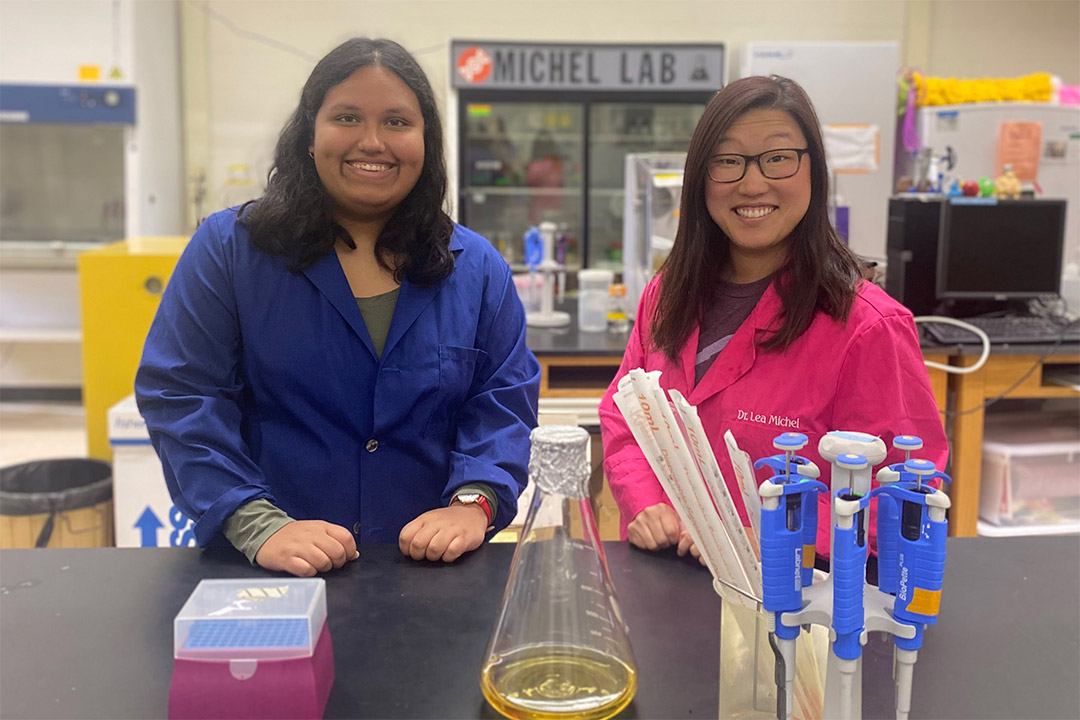International students who started at RIT remotely during the pandemic continue to thrive
A majority of the international students who started remotely last year are now at the Henrietta campus
Nidhi Baindur, left, was one of more than 200 international students who began their studies at RIT remotely in fall 2020, including 65 undergraduate students and 159 master’s students. When she finally made it to the RIT campus for the first time in June 2021, she dove headfirst into the research lab, participating in the HHMI Inclusive Excellence Summer Research Experience under Associate Professor Lea Michel, right.
Nidhi Baindur began her college career at Rochester Institute of Technology in an atypical setting—at her home in Mauritius, the small island nation about 1,200 miles off the southeast coast of Africa.
In fall 2020, with the coronavirus pandemic raging and flights out of her country grounded, she thought she would have to defer her college enrollment until after vaccines became available and international travel restrictions lifted. But she said Paul Keller, RIT’s director of international enrollment, reached out to her to discuss alternative options.
“I had this conversation and he asked me if RIT made it possible for me to do it online, would I start so that I didn’t have to miss a whole year sitting at home during the pandemic?” said Baindur. “He guided me through the process and it worked out. I was glad for the opportunity.”
Baindur became one of more than 200 international students who began their studies at RIT remotely in fall 2020, including 65 undergraduate students and 159 master’s students. RIT Admissions officials said the students have done remarkably well given the challenging circumstances and 83 percent of those students are now studying at RIT’s campus in Henrietta. Six of the master’s students continue to study remotely and five have already graduated.
RIT also had 18 international Ph.D. students start their studies online last year. Twenty additional undergraduate students started at RIT’s global campuses in China, Croatia, Dubai, or Kosovo.
Diane Ellison, senior associate vice president in the Office of Graduate and Part-time Enrollment Services, said that since the international students who started remotely last fall have done so well, RIT has continued to offer this as an option for graduate students. Last spring, RIT welcomed five additional international graduate students. In fall 2021, 14 new master’s students and eight new Ph.D. students from outside the U.S. started remotely.
Baindur said part of the reason she believed she’s been successful is because she received an outpouring of support to help make her online experience as immersive and positive as possible. Baindur noted that she and her fellow international students who began remotely received success coaching throughout the year to guide them on how to manage their schedules, work through time zone differences, and stay focused and motivated.
Baindur started as a science exploration student, and to help become part of the RIT community, she joined as many organizations as possible, including the math club, the College of Science ambassadors, and the College of Science Student Advisory Board, and worked for admissions as a content creator blogging about her experiences. She said faculty members such as Jeffrey Mills, senior lecturer from the School of Chemistry and Materials Science, bent over backwards to accommodate her and make her feel like a part of the community.
“I was always included in the group and it’s something I was very thankful for,” said Baindur. “I just feel like I got support from this school that I feel like my other friends don’t have at their schools.”
By the end of the spring semester, Baindur chose computational mathematics as her major, got her coronavirus vaccinations, and was preparing to head to the U.S. for just the second time in her life. When she finally made it to the RIT campus for the first time in June, she dove headfirst into the research lab, participating in the HHMI Inclusive Excellence Summer Research Experience under Associate Professor Lea Michel. She said while there were aspects of online learning she preferred, overall she was extremely happy to be on campus, getting hands-on experience and making friends in-person.
She said, “When I got here I would touch the bricks every day and be like, ‘Oh my God, am I really here?’”











